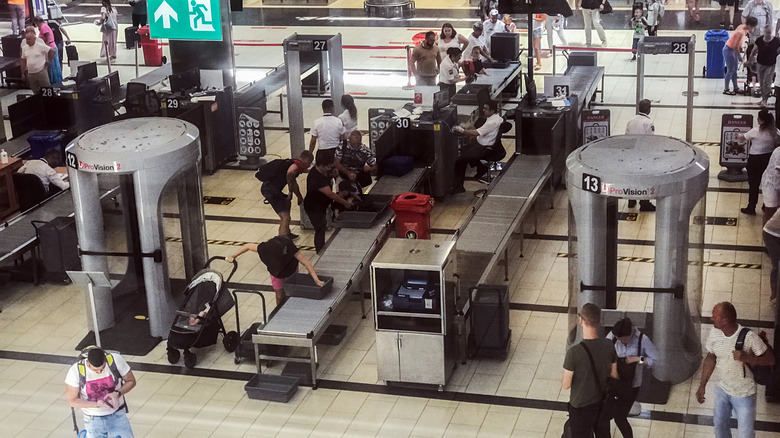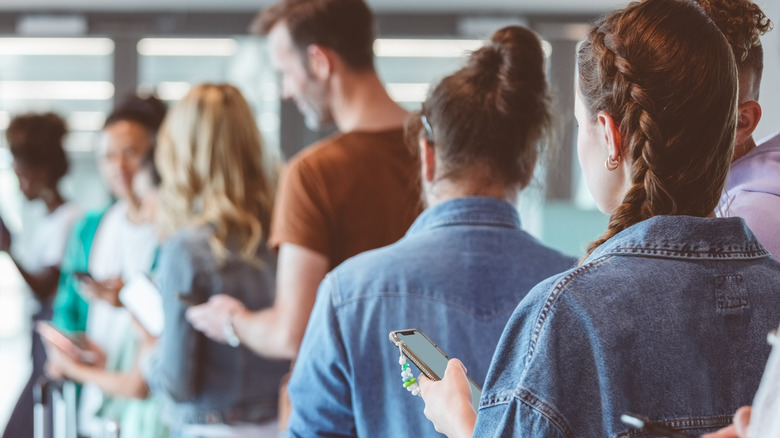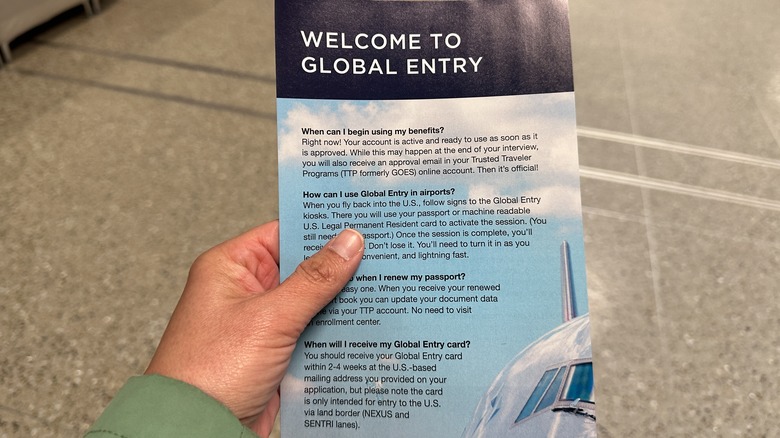You Might Want To Stop Defaulting To The Shortest Line At Airport Security, And Here's Why
"Waiting in line is my absolute favorite thing!" said no one, ever. There's nothing more soul-crushing than having to queue, but when you're traveling, it's unfortunately part of the deal. Whether you're standing in line for a table at the best local eateries in town or waiting for your turn at the hottest amusement parks in the country, it never gets any more exciting. Don't even get us started on airport security, where you're usually stuck with fellow travelers who are just as stressed and desperate to make their flights as you are. And when faced with the decision of picking a queue, you might think you're being clever by eyeing the shortest line, but here's the ugly truth: shorter doesn't always mean faster. In fact, it may sometimes means nothing.
But it's not your fault for being lured in by what initially seems like the quickest option. After all, airports, especially the worst in the world, are infamous for their sluggish queues. Choosing the line with fewer people seems like the most logical choice, but according to seasoned travelers on Reddit, the real trick is scoping out who's in line. Appearances can be deceiving — lines filled with kids often drag on, while those packed with business travelers (suits and all) tend to move much faster.
The shortest line isn't always the fastest line
Your gut might tell you to jump into the shortest line at airport security, especially when you're racing against the clock to make it to your gate. But before you dash in, take a second to scrutinize who is actually in the line. On the sub-Reddit r/LifeProTips, users and travelers have revealed some hard-earned wisdom: families going through the TSA — especially ones with young kids — are notorious for slowing things down for everyone else. One user put it bluntly, "Sometimes airlines let families use the priority security line, which basically just f**** the whole thing up and makes it go slower than the regular line." Another explained: "Groups with kids do expand the length of a line but they are typically more time-consuming. In airports, they have to deal with bags, tablets, toys, strollers, etc."
If you're in a rush (and who isn't at an airport?), your best bet is to spot the business travelers. Apparently, these pros move through security like they've done it a thousand times — because, well, they probably have. "Always get in the line with singles who look like they travel for business often. They have their belts and shoes off fast," advised one user, with another backing it up and quipping: "Look for business dress. Those poor f***ers spend half their lives in airports and have it all down to a fine art. Source: Am poor f***er." In short, while shorter lines may seem like the obvious choice, it's not always about the length but rather who's in them. Avoid the families and follow the frequent flyers — they've likely mastered the TSA security process down to a science.
You can always skip queues altogether through expedited services
Standing in security lines is basically the bane of every traveler's existence, but the good news? You don't have to subject yourself to that each time. Some airports let you skip the hassle entirely without spending a dime. Dallas Fort Worth International Airport (DFW), for instance, has a Fast Pass program that lets you waltz right past the TSA line. All you need to do is book a time slot in advance, and you can reserve up to a week ahead for yourself and up to nine companions. Los Angeles International Airport (LAX) also has its own Fast Lane option, where you can secure an expedited security spot up to three days before your flight, or even on the same day if you're feeling lucky and there are still openings. Plenty of other airports are catching on to this too, so do your research before you fly.
But if you want to guarantee a fast pass every time you travel, there's always the option to pay up. Department of Homeland Security's Trusted Traveler programs like TSA PreCheck and Global Entry have you covered for the long haul. PreCheck costs $78 for five years, while Global Entry (which includes PreCheck and lets you sail through customs when you return home from abroad) is $100 for the same period. Sure, there's some paperwork and a bit of waiting involved, but once you're a member, you can bypass the masses in security lines. Plus, if you hold certain credit cards, you might even get these fees reimbursed, making the convenience essentially free.


